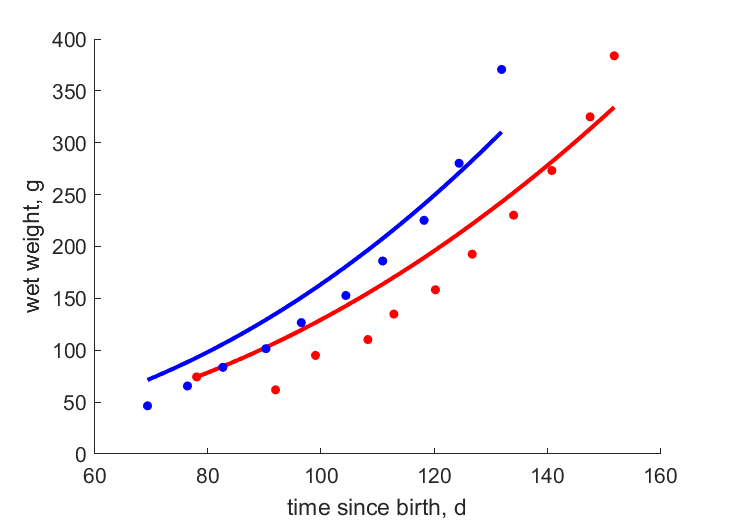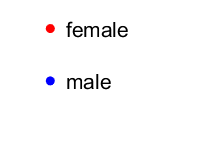Predictions & Data for this entry
| Model: stx | climate: Aw, Cfa, Cfb | migrate: | phylum: |
| COMPLETE = 2.5 | ecozone: TA | food: bxM, xiHl | class: |
| MRE = 0.060 | habitat: 0iTh, 0iTf | gender: Dg | order: |
| SMSE = 0.007 | embryo: Tv | reprod: O | family: |
Zero-variate data
| Data | Observed | Predicted | (RE) | Unit | Description | Reference |
|---|---|---|---|---|---|---|
| tg | 35 | 35 | (9.889e-05) | d | gestation time | HaysTien1993 |
| tx | 150 | 159.7 | (0.06457) | d | time since birth at weaning | MercShar1966 |
| tp | 638 | 704.5 | (0.1042) | d | time since birth at puberty | Russ1982 |
| am | 5621 | 5618 | (0.0005197) | d | life span | WeigJone2005 |
| Wwb | 0.61 | 0.6252 | (0.02499) | g | wet weight at birth | Russ1982 |
| Wwx | 385 | 374.5 | (0.02717) | g | wet weight at weaning | MercShar1966 |
| Wwp | 7000 | 6513 | (0.0696) | g | wet weight at puberty | RobiMorr1957 |
| Wwi | 1.462e+04 | 1.536e+04 | (0.05011) | g | ultimate wet weight | Russ1982 |
| Ri | 0.004115 | 0.004245 | (0.03148) | #/d | maximum reprod rate | AnAge |
| pL | 1.252e+05 | 1.215e+05 | (0.02919) | J/d | average yearly milk production | CorkDove1989 |
Uni- and bivariate data
| Data | Figure | Independent variable | Dependent variable | (RE) | Reference |
|---|---|---|---|---|---|
| tWw_f |   | time since birth | wet weight | (0.1551) | MercShar1966 |
| tWw_m |   | time since birth | wet weight | (0.157) | MercShar1966 |
Pseudo-data at Tref = 20°C
| Data | Generalised animal | Wallabia bicolor | Unit | Description |
|---|---|---|---|---|
| v | 0.02 | 0.02854 | cm/d | energy conductance |
| p_M | 18 | 23.87 | J/d.cm^3 | vol-spec som maint |
| k_J | 0.002 | 0.002 | 1/d | maturity maint rate coefficient |
| k | 0.3 | 0.657 | - | maintenance ratio |
| kap | 0.8 | 0.7026 | - | allocation fraction to soma |
| kap_G | 0.8 | 0.8004 | - | growth efficiency |
| kap_R | 0.95 | 0.95 | - | reproduction efficiency |
| t_0 | 0 | 23.73 | d | time at start development |
Discussion
- Males are assumed to differ from females by {p_Am}, kap_Lm and kap_RL only
- 90 percent of milk production originates from upregulation
- mod_1: males are assumed to differ from femlase by {p_Am} only
- mod_1: t-Ww data added
- mod_2: males have equal state variables at b, compared to females
Bibliography